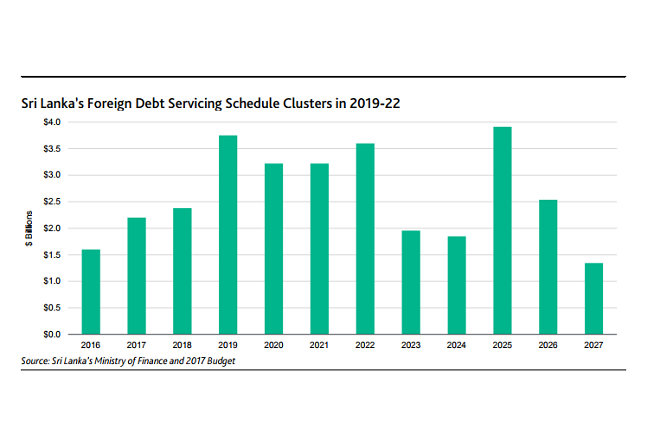Aug 01, 2017 (LBO) - The Hambantota port deal is credit positive for Sri Lanka because it will boost foreign-exchange reserves, which will ease the government’s external liquidity position ahead of several large international bond payments in 2019-22, Moody's said.
Last Tuesday, the government of Sri Lanka (B1 negative) announced that it had finalized its deal to sell a majority stake in Hambantota Port to China Merchants Port Holdings Company Limited (Baa1 negative) for $1.12 billion and under a lease term of 99 years.
Earnings from the Hambantota Port stake sale will feed into the central bank’s foreign-exchange reserves,
which will help bolster investor confidence and encourage future portfolio inflows, Moody's said.
"Importantly, the sale will allow the government to set aside earnings to repay its upcoming debt maturities and reduce its external debt, a key constraint on Sri Lanka’s credit quality. External debt maturities in 2019-22 total $13.8 billion."
Sri Lanka’s balance-of-payments position remains vulnerable after foreign-currency reserves materially declined in late 2016 and early 2017. More recently, reserves have risen somewhat because of capital inflows from international sovereign bond issuance and syndicated loans.
As of June 2017, gross official foreign-exchange reserves (including gold and special drawing rights) were
$6.9 billion.
The foreign-currency reserves portion of gross reserves was slightly under $6.0 billion, covering about 3.75 months of imports, just above the International Monetary Fund’s (IMF) minimum reserves adequacy threshold of three months.
buy avanafil online buy avanafil online no prescription
The Central Bank of Sri Lanka intends to increase gross official reserve assets to at least $7.4 billion by the
end of 2017, in accordance with the targets under Sri Lanka’s current three-year IMF Extended Fund Facility
program.
"We expect the central bank to come close to its target, which would help support the sovereign’s credit quality. Moving forward, greater exchange-rate flexibility and more limited foreign-exchange interventions by the central bank would help preserve reserves."
"Although the Hambantota receipts will ease external pressures, we expect those challenges to remain, given persistent elevated government debt and large borrowing requirements."
"We expect Sri Lanka’s external vulnerability indicator, which measures the ratio of external debt payments that are due over the next year to foreign-exchange reserves, to rise to about 183% in 2017 from around 150% in 2016."
Development of the broader Hambantota Port area will help bring in foreign direct investment, especially
from China. The buildup of associated infrastructure surrounding the port also can help attract greater
private-sector investments, Moody's added.
This, together with other ongoing development projects such as the Western Region Megapolis Plan and Colombo Financial City Project, will provide a stable source of financing for Sri Lanka’s external position and support economic growth.
Closure of the long-pending deal also will allow the government to focus on key priorities, including advancing economic and structural reforms under its IMF program.
Sri Lanka’s port deal boosts foreign reserves, a credit positive: Moody’s

